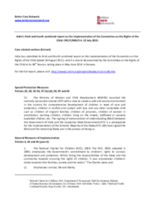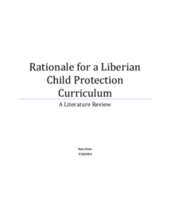Demographic Data
|
Sources: World Bank, UNICEF, UNDP HDR 2015, DHS 2013 |
Displaying 12671 - 12680 of 14580
On Wednesday, July 31 2013, UNICEF launched its “#ENDviolence against children” campaign.
One “ethically-minded” tourism company in the UK is shutting down 10 orphanage tours because the firm believes that “orphanage volunteers, despite their best intentions, are part of the problem rather than the solution for children living in poverty throughout the world."
Lorsque le maintien de l'enfant dans son milieu familial n'est pas possible, le mineur est à la demande de ses parents ou sur décision judiciaire, pris en charge par le Département. Plusieurs solutions peuvent être envisagées pour l'enfant, comme par exemple le placement en famille d'accueil.
A coalition of over 40 international, regional and national NGOs and networks have issued a joint call to member States of the United Nations General Assembly (UN GA) to focus the 2014 Resolution on the Rights of the Child on strengthening family care and providing appropriate alternative care for children.
India submitted its third and fourth combined report on the implementation of the Convention on the Rights of the Child.
The author of this paper argues that it is necessary that child protection professionals have access to training that is specific to Liberia and its needs.
Save the Children East Africa Regional Office (EARO) and Better Care Network (BCN) are looking to recruit a Better Care Network (BCN) Regional Technical & Knowledge Management Specialist.
For children separated from their families, the 139 organizations of the South Asia Alliance of Grassroots NGOs (SAAGN) launched the campaign “My Caring Family is My First Right” in June 2013. As part of the campaign, Butterflies, a registered voluntary organization working with street and working children in Delhi, is supporting a new online petition that calls on governments in the region to respect a child’s right to a family.
This article outlines an approach to assessing the quality of relationships between young foster children and their carers.
Le phénomène des restavek (enfants qui « restent avec » une famille qui n’est pas la leur) a longtemps ete méconnu du public. Pourtant, entre 150 000 et 500 000 enfants haïtiens vivent ce calvaire.




